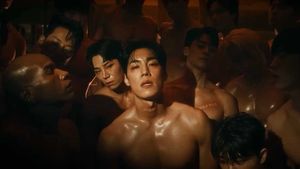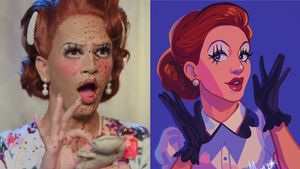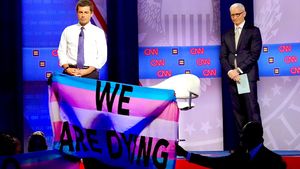CONTACTAbout UsCAREER OPPORTUNITIESADVERTISE WITH USPRIVACY POLICYPRIVACY PREFERENCESTERMS OF USELEGAL NOTICE
© 2025 Equal Entertainment LLC.
All Rights reserved
All Rights reserved
By continuing to use our site, you agree to our Privacy Policy and Terms of Use.
We need your help
Your support makes The Advocate's original LGBTQ+ reporting possible. Become a member today to help us continue this work.
Your support makes The Advocate's original LGBTQ+ reporting possible. Become a member today to help us continue this work.
Tegan and Sara Quin are the last of a dying breed. At a time when the music industry is flailing and bands are routinely signed to recording contracts on the strength of MySpace posts rather than the ability to actually perform live, the 29-year-old Quin sisters represent the old-fashioned, slightly romanticized model for how a band succeeds. It's a model in which the path to success is reachable not via the Internet but only by car--or rather, in a van, surrounded by gear, driving for many, many, many miles on a tour that lasts roughly a decade.
It's a model that seems to have paid off. Now, six albums deep into their career, Tegan and Sara have reached a level of success that seems, at least to the two of them, almost impossible to believe. Having labored together as a band since graduating high school, indie rock's most famous twin sisters are finally coming to terms with what success hath wrought. The band's current album, Sainthood, is the most assured piece of pop music the two have ever recorded, and the ongoing tour--which will take them to points all over the globe--is proving to be their biggest ever (no small feat for musicians who routinely spend as many as 200 days out of the year on the road). Given their commitment to their work, their general accessibility, and the fact that they are both out lesbians, it's no surprise that they command such a loyal and demanding fan base. This wasn't always the case, though.
"It's horrifying," Tegan says, laughing. "We've been doing this now for 12 years. We can joke about it now, but I sometimes still lie in bed at night and start to have anxiety when I think back on the way things were when we started. We were never the kind of people who would do anything to be famous or would do whatever it took to have a career in music. Our primary motivation sprang from the fact that we didn't know what we wanted to study at university and we didn't want to be a drain on our parents. Music seemed to be working, so we just figured that we'd stick with it for a while. This was at a time when we didn't have cell phones or laptops. We didn't even have credit cards. The first couple of years were very scary and pretty lonely."
The road to success might have been a long one, but the sisters agree that for them, the journey was necessary. Looking back, it's hard to believe that the two vaguely awkward women singing on their 1999 debut, Under Feet Like Ours, are the same two people tearing through the jagged pop gems of Sainthood and relentlessly working some of the world's biggest festival stages. The difference that a decade of touring can make is not lost on the band.
"There's a reason it took so many years for Tegan and me to get here," Sara says. "At least four or five of those years were spent just trying to figure out what kind of musicians we were going to be and learning how the music industry actually works. Because those first years and so many of those tours were done without the benefit of the Internet, there was a lot of blind ambition happening. We knew we were working toward something bigger, but I don't think we ever really understood what exactly that was."
Blind ambition or not, with each successive tour Tegan and Sara saw their popularity continue to grow. Shows got bigger, album sales increased, and things generally got weirder. By the time they recorded The Con in 2007, the size and scope of the band had increased dramatically, but so had all the complications. After a knock-down, drag-out brawl erupted between the sisters backstage at a show ("Bouncers literally had to peel us apart from each other," Tegan says), they took a step back to reassess exactly how they were going to work together. Both seem to view that moment as a necessary turning point. In a band with two self-avowed workaholic control freaks, slowing down can often be the hardest thing.
"It doesn't matter if people have already paid their 30 bucks to come and see us play," Tegan says. "I still assume that I have to come onstage and work really hard from start to finish. The whole thing, from the music we play before we come onstage to the opening bands to the merch we sell to our set list--it's all superimportant to us. I'm obsessed with making sure that people have a good time. Unless someone is being an asshole--then I'm the first one to say 'Fuck you, get out!' "
Also difficult for the band has been dealing with the pressures of increased--and very often misdirected--media scrutiny. Rather than focusing on the group's rather remarkable transformation from strummy folksters to new-wavin', indie-pop daredevils, the bulk of Tegan and Sara's collected press could essentially be summed up in two words: gay twins. Only within the past couple of years have journalists gotten past the women's twinergy and never-a-secret lesbianism and started to discuss what ace songwriters the two have become.
"It's so funny," Sara says. "For the first half of our career, people rarely ever actually talked about our music. Things were so focused on who we were and what we looked like and what we did or didn't represent that we were sort of allowed to develop as songwriters without too much input on that front. I wonder if people had been focused solely on our music back then if it would have affected our work, or if we would have gotten discouraged and just given up. We just always thought that if we kept going long enough, maybe eventually people would want to talk to us about our songs and maybe someone would acknowledge the fact that we can actually write melodies that are poppy and smart. In a way it's great that we never felt the pressure to sound like anything other than ourselves...mostly because no one else seemed to care!"
"I could go on and on about being young and being women and being twins and being gay," Tegan adds, "but those were also the things that people often used to discredit our abilities and our songwriting. At least now even the naysayers will at least give us credit for being persistent. Twelve years! We don't give up!"
While gay fans have always embraced the band, both sisters have struggled with how they are perceived. While the women have always talked freely and openly about their sexuality, it is rarely the subject of their work, which might explain why the gay press has not paid as much attention to the duo as one might guess. "My art is not gay," Tegan says. "But I am. Still, there's this feeling I get sometimes, like, we're just not gay enough."
"I mean, don't we look gay enough?" Sara says, laughing. "We're pretty gay. And it's tiresome sometimes to talk about it--'Yep, we're still gay!'--but as our fan base gets bigger and continues to broaden, it's even more important to talk about it. Our music should affect people because it's hopefully good pop music and because we sing about things that are universal to all people. The idea that we need to gay it up somehow is funny to me."
Having spent the bulk of the past decade sharing a stage has made Tegan, who lives in Vancouver, and Sara, who resides on Montreal, into a formidable live act, but it's not just all about their musicianship. Their onstage banter and propensity for storytelling has, over time, become a much-beloved part of the nightly set. "Sometimes I'm more proud of that than I am of our songs," Tegan jokes. "I mean, that shit isn't scripted! We never even tell the same story twice."
The duo's penchant for humor and the fact that they each talk a lot--and very fast--combine to not only make them ideal interview subjects but explain why hard-core fans have such a visceral connection to them. "People feel like they know us," Tegan says. "They don't necessarily come to the show because 'Nineteen' is such an awesome song; they come because they feel like they are hanging out with us. And they are. We want people to feel that way."
One of the few times Tegan or Sara suddenly becomes serious is when asked to consider what life might be like if Tegan and Sara the band were ever to end.
"We played a big show at Massey Hall in Toronto on the day that Kate McGarrigle passed away," Tegan says. "At the end of our set we dedicated our last song to Kate, this amazing Canadian woman who had spent most of her life playing music with her sister. So, as we're about to launch into the last song, Sara stops and says, 'You know, all night I've been feeling really upset because there's no one else I'd want to spend the rest of my life with besides Tegan. I'm so happy to be in a band with her and share a stage with her and have her as my sister.' It totally put all the craziness of our lives into perspective...but then I was like, Damn it, how am I supposed to play this song if I'm crying? Thanks, Sara!"
Recommended Stories for You
From our Sponsors
Most Popular
More Videos
0 seconds of 1 minute, 54 secondsVolume 0%
Press shift question mark to access a list of keyboard shortcuts
Keyboard Shortcuts
Shortcuts Open/Close/ or ?
Play/PauseSPACE
Increase Volume↑
Decrease Volume↓
Seek Forward→
Seek Backward←
Captions On/Offc
Fullscreen/Exit Fullscreenf
Mute/Unmutem
Decrease Caption Size-
Increase Caption Size+ or =
Seek %0-9
Copied
Live
00:00
01:54
01:54
Watch Now: Pride Today
Latest Stories
Which country is about to implement a nationwide transgender bathroom ban?
August 08 2025 2:15 PM
Parents of bullied trans teen who died by suicide sue Alabama school district
August 07 2025 6:54 PM
Piers Morgan says Beyoncé is 'culturally appropriating Marilyn Monroe'
August 07 2025 3:39 PM
Trump cans IRS commissioner and replaces him with Scott Bessent for now
August 08 2025 3:43 PM
Massachusetts lesbian Gov. Maura Healey signs abortion and gender-affirming care shield law
August 08 2025 12:28 PM
Gaya International Airport will keep 'GAY' code, despite conservative push to change it
August 07 2025 3:27 PM
'South Park' eviscerates Kristi Noem for killing a puppy and abusing Botox
August 07 2025 11:44 AM
State Dept. omitting anti-LGBTQ+ actions from foreign human rights reports
August 08 2025 5:52 PM
The fight to eradicate dangerous ‘conversion therapy’ isn’t over, alarming new report warns
August 08 2025 3:34 PM
Florida teacher fired for using student's nickname won't get her job back
August 08 2025 11:52 AM
Gay Jamaican asylum seeker 'suffering' in ICE custody, lawyer says
August 08 2025 11:42 AM
Botswana’s queer lifelines are vanishing
August 08 2025 6:00 AM
JD Vance's leaked Spotify playlist is filled with gay anthems
August 07 2025 3:41 PM













































































